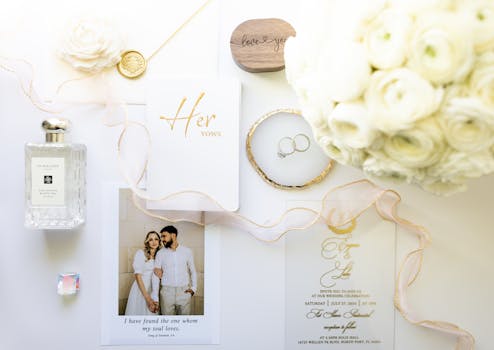Finding Your Perfect Planning Balance
Achieving the ideal balance in wedding planning requires understanding your priorities and personal style. Recognizing what elements of your wedding mean the most to you allows you to allocate your time and budget effectively. For instance, if floral arrangements are a passion of yours, investing in exquisite flowers can be a top priority, while you might consider more budget-friendly options for favors.
Another critical aspect of finding balance lies in collaboration. Enlist the help of family or friends who can provide support and different perspectives. This not only eases your workload but can infuse creativity into the planning process. Sharing ideas and delegating tasks ensures you’re not carrying the entire planning burden alone.
Staying adaptable is also essential. Wedding planning rarely unfolds exactly as envisioned, and factors like weather or vendor availability might require shifts in your original plans. Embracing flexibility will enable you to respond positively to challenges while still maintaining the essence of your vision. Create a contingency plan for critical elements; knowing you have alternatives can alleviate stress.
Utilize technology to your advantage. Wedding planning apps and online checklists can help you stay organized and on track. These tools can streamline your tasks and give you a clearer picture of what needs your immediate attention.
Finally, remember to prioritize self-care throughout the planning process. Taking breaks, engaging in activities you love, and nurturing relationships outside wedding planning will lead to a healthier mindset. A balanced approach to planning will reflect on your special day, resulting in a more enjoyable and memorable experience for both you and your guests.
Signs You Need More Frequent Consultations
If you’re feeling uncertain about your wedding plans, it might be time to schedule more consultations. Frequent meetings help you stay aligned with your vision and ensure all details are covered.
One major sign is when you start experiencing a lack of clarity about your wedding theme or style. If you find yourself second-guessing decisions about color schemes, venues, or attire, additional guidance can help solidify your preferences.
Another indicator is a growing list of questions. As you progress with planning, it’s natural for new concerns to arise. If those questions begin to pile up, seeking expert advice can be beneficial.
Moreover, feeling stressed or overwhelmed indicates that you need support. Weddings can be challenging to coordinate. If the excitement turns into pressure, reaching out for more consultations can alleviate some of that anxiety.
If timelines are becoming tight, frequent check-ins are essential. Last-minute adjustments often arise, and having an expert on speed dial can ensure that everything remains on track.
Lastly, if you notice that you’re no longer enjoying the planning process, it might be time for more guidance. Wedding planning should be a fun experience. If it feels like a chore, consider consulting professionals who can help reinvigorate your excitement and provide fresh ideas.
Types of Wedding Planning Services
Wedding planning services come in various formats to cater to different needs and styles. Here are some types that stand out:
Full-Service Wedding Planning involves complete oversight from start to finish. This is ideal for couples who want a comprehensive service where every detail is handled. I’ve found that hiring a full-service planner can alleviate the stress of coordinating multiple vendors.
Partial Wedding Planning offers flexibility for couples who have already begun planning but need help with specific aspects. This option provides guidance and support, allowing couples to maintain control while benefiting from expertise in certain areas.
Day-of Coordination focuses on executing the wedding day flawlessly. Planners in this category typically step in once the details are in place to manage the logistics. I appreciate this service because it allows couples to enjoy their day without worrying about the finer points.
Destination Wedding Planning is tailored for couples looking to tie the knot in a unique location. These planners are familiar with local vendors, laws, and customs, which can be incredibly beneficial. I believe this service can enhance the experience of getting married somewhere special.
Virtual Wedding Planning has gained popularity, especially for couples unable to meet in person with planners. This service leverages technology to offer planning assistance remotely. Personal engagement and creativity can shine through even via a screen.
Ultimately, the right type of wedding planning service depends on your personal preferences, budget, and the level of involvement you want in the planning process. Selecting the service that aligns with your vision can significantly influence your wedding experience.
How Often Should You Meet Your Wedding Planner?
Determining how often to meet with your wedding planner is crucial for a smooth planning experience. I believe that the frequency of meetings should align with the complexity of your wedding. For couples planning a large wedding with numerous details, I recommend meeting at least once a month. This allows you to stay on track with vendor bookings, timelines, and any adjustments that arise. If you’re managing a more intimate celebration, bi-monthly meetings might suffice. These can be shorter and focused, ensuring that every aspect is addressed without overwhelming either party.
During the initial stages of planning, when choices abound, I find that weekly check-ins can be beneficial. This period is when ideas are flowing, and decisions need prompt attention. Frequent communication can help keep things organized and prevent last-minute scrambles as the big day approaches.
As the wedding date approaches, I often suggest transitioning to weekly or bi-weekly meetings. This ensures all details are polished and any potential issues can be tackled head-on. Additionally, during this time, it’s important to maintain open lines of communication via email or phone for urgent matters. Remember, your planner should also be available for quick updates between scheduled meetings.
Ultimately, finding the right balance in meeting frequency will depend on your personal comfort and planning style. Trust your instincts and ensure you feel supported and informed throughout the entire process.
Typical Wedding Planning Timelines
A comprehensive overview of scheduling milestones for wedding planning to ensure nothing is overlooked.
- 12 Months Before: Set the budget, finalize your guest list, and book the venue. This is essential to establish your wedding’s foundation.
- 10 Months Before: Select your wedding party and start shopping for attire. This allows ample time for fittings and alterations.
- 8 Months Before: Hire key vendors such as a photographer, caterer, and florist. Their availability can become limited, so act swiftly.
- 6 Months Before: Send out save-the-date cards. This gives guests a heads-up, especially for destination weddings.
- 4 Months Before: Finalize details with your vendors and arrange transportation. Confirming all arrangements gives peace of mind.
- 2 Months Before: Mail invitations and start planning your rehearsal dinner. This keeps your timeline on track and guests informed.
- 1 Month Before: Confirm RSVPs and create a seating chart. This is when everything comes together for the big day.
- 1 Week Before: Provide a final headcount to your caterer and prepare your wedding day emergency kit. Preparation is key to handling any last-minute issues.
Oct 25, 2022 …You (and every other couple!) needs to ask the venues directly. Although booking the venue is not the first step to wedding planning. Setting …
Apr 6, 2023 … In the beginning of my wedding photography career, clients would often ask me to do non-photography tasks. … What does luxury mean to you?
Dec 15, 2023 … This is why a lot of vendors don't put their pricing out on their websites and make you have a phone call consultation with them (to discuss if …
Something I am often asked early in the planning journey of destination weddings is: 'Do you have any tips for flying with a wedding dress?
Flying With A Wedding Dress: A Destination Wedding Planner’s …
Sep 7, 2024 … … you ask yourself: how do I become a wedding planner with no experience? … often have a “site coordinator” who helps to facilitate the wedding.
Dec 12, 2022 … … luxury wedding planner I have to add a disclaimer: Your priorities do … 77 I Wedding Timelines: Who Should You Book When? Ask the Planner …
Wedding Timelines: Who Should You Book When? | Verve Event Co.
Understanding the Role of a Wedding Planner
A wedding planner is an invaluable resource for couples wanting to create a memorable celebration. They manage the intricate details involved in planning a wedding, ensuring every aspect aligns with the couple’s vision. With expertise in vendor selection, budgeting, and event coordination, a skilled wedding planner can alleviate a lot of stress. They possess extensive networks, allowing couples to access quality vendors—be it florists, caterers, or photographers—who align with their style and budget. This means less legwork for couples and more time to focus on their love story. Furthermore, planners handle contracts, ensuring that all agreements are met and that the couple isn’t left with any unexpected surprises on their big day. On the day of the wedding, a planner is like the conductor of an orchestra, ensuring that everything flows perfectly. They coordinate timelines, manage vendors, and address any unforeseen issues that arise, allowing couples to immerse themselves in their celebration without distractions. Some couples wonder if hiring a planner is a luxury; however, it can actually be a prudent choice that ensures their wedding reflects their dreams while staying within budget. In essence, wedding planners are dedicated to making your special day as enchanting as possible.
DIY vs. Hiring a Planner: What’s Right for You?
Choosing between DIY planning and hiring a wedding planner can significantly impact your wedding experience. If you have a creative flair, enjoy organization, and want to personalize every detail, DIY might be your best bet. There’s a certain joy in handcrafting centerpieces or designing your own invitations—it’s all about your unique touch. However, this approach can be time-consuming and stressful, especially if you’re balancing work or family commitments. If you’re feeling adventurous and have the time to dedicate to planning, making everything yourself can transform into a delightful project.
On the other hand, hiring a planner can alleviate a significant amount of stress, allowing you to focus on the elements of the wedding you love most. A seasoned planner brings industry knowledge, vendor relationships, and a clear understanding of timelines and budgets. They’ll navigate the complexities of your big day, including negotiation with vendors and problem-solving on the spot. If you envision a larger wedding with multiple moving parts, or if planning overwhelms you, bringing in a professional may be the way to go.
Consider the financial aspect as well. DIY can save money, but when you factor in potential mishaps or time away from work, costs can quickly rise. Conversely, a planner may charge a fee, but their services often lead to savings through vendor discounts and ensuring that everything runs smoothly on the day itself. Think about what you value more—personalized touches or a stress-free experience. Ultimately, your wedding is a reflection of you and your spouse-to-be, so select the option that aligns best with your vision.
Checklist of Planning Tasks Requiring Planner Input
To make your wedding planning process streamlined and efficient, focus on these essential tasks where a planner’s expertise can be invaluable.
- Venue Selection: A planner can help identify venues that fit your vision and budget, ensuring you secure the perfect spot.
- Vendor Recommendations: Utilizing a planner’s connections can lead you to trusted vendors who are reliable and within your budget.
- Timeline Development: A detailed timeline is crucial. A planner knows what to schedule and when to keep everything on track.
- Budget Management: They can provide strategies to allocate your budget effectively, helping you avoid overspending on unnecessary items.
- Design and Theme Coordination: A planner can assist with creating a cohesive design that reflects your personal style throughout your wedding.
- Guest Management: Having help with RSVP tracking and seating arrangements can eliminate a lot of stress.
- Rehearsal Coordination: A planner can ensure that your rehearsal runs smoothly, setting everyone up for success on the big day.
- Problem-Solving on the Day: A planner is invaluable for handling any unexpected issues that arise, allowing you to enjoy your celebration.
Benefits of Hiring a Luxury Wedding Planner
Exploring the compelling reasons to consider a luxury wedding planner for your special day.
- Expertise in High-End Services: A luxury wedding planner has extensive experience working with elite vendors, ensuring top-quality service and products.
- Creative Vision: These planners possess a unique knack for designing unforgettable experiences, transforming your ideas into exquisite realities.
- Stress Reduction: Hiring a planner means alleviating much of the planning pressure, allowing you to focus on enjoying the process and your partner.
- Access to Exclusive Resources: Luxury planners have connections to exclusive venues, catering services, and entertainment options that elevate your wedding beyond the ordinary.
- Personalized Focus: They dedicate time to understanding your vision intimately, ensuring every detail reflects your personalities and preferences.
- Budget Management: Contrary to what some believe, a skilled luxury planner can actually save you money by negotiating better deals with vendors.
- Crisis Management: Their experience means they can swiftly resolve any issues that arise, keeping your wedding day running smoothly.
Top Reasons to Consult a Wedding Planner
Consulting a wedding planner can transform the entire experience of planning your wedding, making it smoother and more enjoyable. Here are some compelling reasons to consider working with one.
- Expertise in Vendor Selection: A wedding planner has established relationships with reliable vendors, ensuring you tap into top-quality services for your cake, flowers, and entertainment.
- Time-Saving Convenience: Planning a wedding demands countless hours of coordination and communication; a planner handles these tasks, allowing you to focus on enjoying your engagement.
- Creative Vision and Design: With a keen eye for aesthetics, a planner can help you define and execute your wedding theme, ensuring every detail aligns with your vision.
- Budget Management Expertise: A planner can guide you in creating a realistic budget, helping prioritize your spending and finding ways to achieve stunning results without overspending.
- Crisis Management Skills: Amidst the chaos of wedding planning, unexpected issues can arise. A planner is trained to solve these challenges efficiently, keeping stress at bay。
- Customized Coordination: From timelines to seating charts, a planner ensures everything runs smoothly on the big day, allowing you and your loved ones to just enjoy the moment.
Budgeting for a Wedding Planner
Hiring a wedding planner is a significant expense, but it can also be a game changer for your wedding planning experience. The first step is deciding how much of your overall budget you’re willing to allocate to this service. Generally, wedding planners charge anywhere from 10% to 20% of your total wedding budget, depending on their expertise and the services they provide.
Understanding the various types of planners and the packages they offer is crucial. Some planners charge a flat fee, while others may work on an hourly basis. It’s essential to outline what services you want, such as day-of coordination, full-service planning, or partial services, and compare their costs accordingly.
Always ask for detailed breakdowns of their pricing. This will prevent any hidden fees from cropping up later. Consider additional costs that may arise, such as travel expenses or special services that might not be included in the base rate.
Don’t forget about the benefits of hiring a planner. They can save you time and stress, potentially help negotiate better vendor deals, and ensure things run smoothly on your wedding day. Their relationships with vendors can also lead to discounts that might offset their fees. Ultimately, weigh the costs against the value they bring to your planning process.
Effective communication about your budget is vital. Be transparent about your financial boundaries and expectations from the start. A good planner will respect your budget and help you maximize it, while still maintaining your vision for the day.
When to Start Considering a Wedding Planner
I believe that recognizing the right moment to hire a wedding planner can significantly elevate your planning experience. If you’re feeling uncertain about how to start or overwhelmed by the sheer number of tasks ahead, it’s worth considering bringing in a professional early on. Hiring a wedding planner at the beginning of your planning process can save you time, energy, and possibly even money. They can provide insights on budget management, vendor recommendations, and the latest trends, helping you create a cohesive vision for your wedding from the outset.
Another crucial time to think about a wedding planner is when you finalize your venue. Having a planner who is familiar with your venue can make a significant difference, as they know what works and what doesn’t in those spaces. They can navigate logistical details and vendor coordination with the venue, ensuring that your day unfolds as planned.
If you find that your wedding is growing in size or complexity—a larger guest list or multiple locations, for example—consider involving a planner sooner rather than later. They will help you manage timelines and resources effectively, preventing common pitfalls. Additionally, if you’re juggling work or other commitments, a planner can handle the details and vendor communications, allowing you more time to focus on enjoying the process.
Ultimately, don’t hesitate to hire a wedding planner if you feel the planning is detracting from your excitement about the wedding. Their expertise can transform your experience, giving you peace of mind and letting you savor each moment leading up to your big day.
As an Amazon Services LLC Associates Program participant, we earn advertising fees by linking to Amazon, at no extra cost to you.
What is the average cost of hiring a wedding planner?
The average cost of hiring a wedding planner typically ranges from $1,500 to $5,000. This figure can vary significantly based on factors like the planner’s experience, location, and the complexity of the wedding. For instance, planners in larger cities often charge higher fees due to increased demand and cost of living. Some planners charge a flat fee, while others may take a percentage of your total wedding budget, usually between 10% to 20%. Additionally, full-service planners, who oversee all aspects of your wedding from start to finish, usually command higher fees compared to those offering month-of coordination. It’s essential to consider what services are included in the quoted price as this can impact overall value. Although hiring a planner might seem like a sizable expense upfront, their expertise can often lead to savings in other areas and a more organized event.
How many meetings should I schedule with my planner?
I believe scheduling 3 to 5 meetings with your wedding planner is ideal. This allows us to cover essential elements such as the overall vision, vendor selection, and final details without feeling rushed. The first meeting should focus on understanding your style and budget. In the second meeting, you can discuss your preferred vendors and any venue specifics. The last few meetings should concentrate on logistics and final touches. Depending on your wedding complexity, you might need additional sessions for specific issues or vendor coordination. Keeping the lines of communication open is crucial, so don’t hesitate to reach out in between meetings for any questions that arise.
Can a wedding planner help with last-minute changes?
Absolutely, a wedding planner is essential for handling last-minute changes. Weddings can be unpredictable, and having a planner means you’re not facing surprises alone. They have a network of vendors and the experience to navigate potential crises quickly, whether it’s a last-minute change in venue or a vendor canceling. Their ability to problem-solve efficiently is invaluable. Most planners are skilled at keeping things on track, ensuring that your vision remains intact even if you need to pivot unexpectedly. They offer calm, organization, and solutions when things get chaotic. With a wedding planner, you can focus on enjoying your day while they manage the practical aspects.
What tasks can I handle myself?
I firmly believe that many elements of wedding planning can be tackled independently with the right approach. First, take charge of designing your invitations; online tools allow you to customize templates easily. Creating a cohesive theme through DIY decor is absolutely doable. From centerpieces to signage, the possibilities are endless and budget-friendly. Personalizing favors adds a special touch that guests will appreciate. Consider making them at home for a unique flavor. Handling communication with vendors is manageable as well; just stay organized. If you’re feeling adventurous, try your hand at baking a cake or cupcakes. Making your own playlist for the reception ensures the music reflects your taste. Lastly, enlist your friends and family for help—they often love to be involved. Embrace these tasks to add a personal touch to your special day.
How do I find the right luxury wedding planner for my needs?
Start by defining your vision and budget. Knowing what you want can help narrow down planners who specialize in your desired style. Look for planners with a proven track record in luxury weddings. Read reviews and seek recommendations. Speak to past clients to gauge their satisfaction. Schedule initial consultations to assess compatibility; you want someone who communicates well and understands your vision. Ask about their relationships with vendors. A planner with strong vendor connections can often secure better deals and quality services. Finally, trust your instincts—this person will be crucial in bringing your dream day to life, so ensure you feel comfortable and confident in your choice.
Is it worth investing in a luxury wedding planner?
Investing in a luxury wedding planner can be a game changer for your special day. They bring a wealth of experience, connections, and resources that can elevate your wedding beyond ordinary expectations. With a luxury planner, you’re not just paying for their time; you’re accessing their extensive network of top-tier vendors. From florists to photographers, they can secure the best in the industry, often at exclusive rates. Moreover, their expertise ensures every detail is meticulously planned and executed, minimizing stress for you and your family. This is particularly valuable on a day filled with emotions and joy, where you want to focus on celebrating rather than managing logistics. If your vision includes unique features or high-end elements, a luxury planner is often the only way to bring those concepts to life flawlessly.
A luxury wedding planner can significantly decrease anxiety while saving valuable time. Their expertise ensures every detail is managed efficiently, allowing couples to focus on joy rather than logistics.
Engaging vendors early can significantly ease stress and improve your choices. Early consultations also secure your preferred options, ensuring your vision is prioritized from the beginning.
Regular meetings are essential to keep everything aligned with my vision and budget. Frequent discussions help address any discrepancies and ensure every detail reflects my dreams for the big day.
Regular communication with vendors and your wedding party is crucial. It ensures everyone is aligned on timelines, tasks, and any changes. Missing these check-ins can lead to chaos.
Knowing exactly what your planner offers directly influences your choices. I find that clarity on their services allows me to align my vision with what they can provide, ensuring my wedding reflects my style perfectly.
Combining DIY projects with professional assistance creates a balanced approach. I find that personal touches enhance the wedding while professionals ensure quality and reduce stress.
Open dialogue with your planner is crucial. Clarifying your vision, preferences, and expectations ensures every detail aligns with your dream, resulting in a memorable experience.
Focus your meetings on critical milestones to ensure you’re addressing essential planning tasks and keeping everything on track. This avoids wasting time and keeps everyone aligned on your vision.
As an Amazon Services LLC Associates Program participant, we earn advertising fees by linking to Amazon, at no extra cost to you.

I’m Marta, a passionate wedding specialist with over 25 years of experience in the wedding and party planning business.









